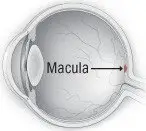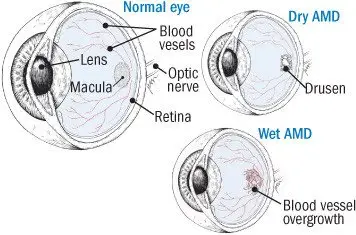What is Macular Degeneration?

Macular degeneration is a common cause of vision problems among older people. Macular degeneration is also called age-related macular degeneration, or AMD.
AMD damages the macula. The macula is a part of the eye that is responsible for seeing sharp details directly in the center of the field of vision. Damage caused by AMD can interfere with:
- The ability to see straight ahead. This is necessary for driving and viewing distances, such as when recognizing faces or watching television.
- Fine, detailed vision. This is necessary for reading newsprint, sewing, working with crafts and making repairs.
|
|
Most people with AMD have fluffy, yellow-white spots on the macula. These spots are called drusen. Not everyone who gets AMD has these spots.
There are two forms of AMD:
- Dry AMD: The vast majority of people who lose significant vision from AMD have dry AMD. In dry AMD, the cells of the macula slowly break down. This produces blurring then blank spots in the eye's central vision. The symptoms are subtle at first then become more noticeable over time.
- Wet AMD: In wet AMD, delicate new blood vessels begin to grow beneath the retina. They leak blood and fluid into the macula, causing scarring. Wet AMD can cause rapid loss of vision over days to weeks and continued loss of vision over time. Wet AMD is much less common than the dry form. But it generally progresses much more rapidly and is therefore more serious.
|
|
Age is the most important risk factor for AMD. Cigarette smoking and cardiovascular risk factors, such as high cholesterol levels, may also increase risk.
Symptoms
Dry AMD sometimes does not cause any symptoms. Or, it can make central vision a little less clear. In a small number of cases, it gradually causes more significant blurring or loss of vision in the center of the visual field. In these more advanced cases, faces and printed words become hard to recognize.
As a first symptom of wet AMD, straight lines or edges appear crooked. Images become blurred. In some cases, this is followed by a central blind spot, as in dry AMD. However, unlike in dry AMD, this vision loss usually develops rapidly.
AMD generally does not affect side vision, even in advanced cases. Most patients can continue to function independently.
People who have AMD appear to see normally. But they may actually have difficulty recognizing friends. This can lead to social difficulties.
Some people with vision loss from AMD experience visual hallucinations. That is, they see things, such as people and patterns, that are not there.
Diagnosis
Your doctor will ask questions about your health history and about any risk factors you may have for AMD. He or she then will thoroughly examine your eyes, testing your visual acuity. In some cases, your doctor may use an Amsler grid test. The Amsler grid test uses a drawing of vertical and horizontal lines with a dot in the middle. You are asked to stare at the dot. If you have AMD, some of the lines will appear bent or distorted or even missing.
|
|
Expected Duration
AMD is a lifelong illness. However, few people with early AMD develop advanced AMD with vision loss.
Prevention
There is no proven way to prevent AMD.
However, evidence suggests that people with a history of smoking are more likely to develop AMD. If you don't smoke, don't start. If you do smoke, try to quit.
Some (but not all) evidence suggests that a diet rich in green leafy vegetables, fruits, fish and nuts may reduce the risk of AMD.
Treatment
Unfortunately, there is no cure for wet or dry AMD. Treatments can help slow or stop the disease from getting worse.
Your treatment options depend on the type of AMD you have.
Dry AMD
For people with intermediate dry AMD, a specific combination of vitamins may slow the disease's progression. They may even prevent it from worsening to advanced AMD. For people with advanced AMD in only one eye, these vitamins may help prevent the other eye from being affected.
The National Eye Institute's Age-Related Eye Disease Study (AREDS) found that the following vitamin formula significantly reduced the chances that someone with high risk of advanced dry AMD would get it:
- 500 milligrams of vitamin C
- 400 International Units of vitamin E
- 15 milligrams of beta-carotene (often labeled as equivalent to 25,000 International Units of vitamin A); because beta-carotene has been linked to an increased risk of lung cancer in smokers, lutein (10 mg) and zeaxanthin (2 mg) should be taken instead of beta-carotene in those who smoke
- 80 milligrams of zinc as zinc oxide
- 2 milligrams of copper as cupric oxide
Talk with your doctor before starting this kind of vitamin regimen. Be sure to mention if you take any other vitamins, including a multivitamin. Because the AREDS vitamin formula contains high doses of certain vitamins, you have to be sure you don't get too much of any particular one.
Eating a diet rich in leafy vegetables and nuts may help slow the worsening of dry AMD.
Wet AMD
For people with wet AMD, daily oral vitamins and supplements (as described above) are recommended. In addition, there are currently three treatments that can slow or prevent the decline of vision loss in people with wet AMD.
One treatment is anti-VEGF therapy. When injected into the eye, these drugs may stop the growth of new abnormal blood vessels. They also decrease leakage from those vessels. Anti-VEGF therapy may even restore lost vision.
Patients need to get injections regularly for several months to a year, and maybe longer. Possible side effects include:
- Eye pain
- Irritation
- Discharge
- Seeing spots or floaters
Most people don't develop these side effects.
Anti-VEGF treatments are generally painless. The doctor numbs the eye before administering the injection.
Other treatments that can slow or stop the progression of wet AMD include thermal laser surgery and photodynamic therapy. These are used much less frequently than anti-VEGF therapy.
Laser surgery burns the leaky blood vessels to seal them. Unfortunately, the laser treatment can also destroy some surrounding healthy tissue, thereby harming vision.
Both laser surgery and photodynamic therapy can temporarily slow the worsening of wet AMD. But they don't stop or reverse the damage. Both procedures may need to be repeated from time to time. In photodynamic therapy, a light-activated drug called verteporfin (Visudyne) is injected into a vein in your arm. The drug moves through your body and to your eyes. The doctor shines a light into your eyes to activate the drug. The activated drug kills abnormal blood vessels.
For active or sight-threatening disease, other options include injections of bevacizumab, aflibercept, or ranibizumab into the eye with or without laser surgery.
The treatment of wet AMD is changing quickly. Make sure to seek treatment from a retinal specialist who has kept up to date on this rapidly evolving field.
Low vision aids
Patients who have lost vision because of AMD may be able to use low-vision aids to read or do other tasks.
Low-vision aids include:
- Optical devices:
- Magnifying spectacles
- Handheld magnifiers
- Stand magnifiers
- Computer monitors with large type
- Non-optical devices:
- Books and newspapers with large print
- Talking computers
- High-contrast watch dials
- Enhanced lighting
Treatment options
The following list of medications are in some way related to or used in the treatment of this condition.
- Lucentis
- Eylea
- Vabysmo
- Visudyne
- Beovu
View more treatment options
When To Call a Professional
Call your doctor immediately if you notice any change in your vision. This is especially true if the change happens suddenly and interferes with your ability to read newsprint or to recognize people's faces.
If you are at high risk of vision loss from AMD, you may keep a copy of the Amsler grid at home. Check your own vision periodically.
Prognosis
Dry AMD develops slowly. Most people who have it continue to lead relatively normal lives, especially if only one eye is affected.
If you have wet AMD, consult with a skilled retina specialist to see what form of therapy is best for you.
Additional Info
National Eye Institute
http://www.nei.nih.gov/







